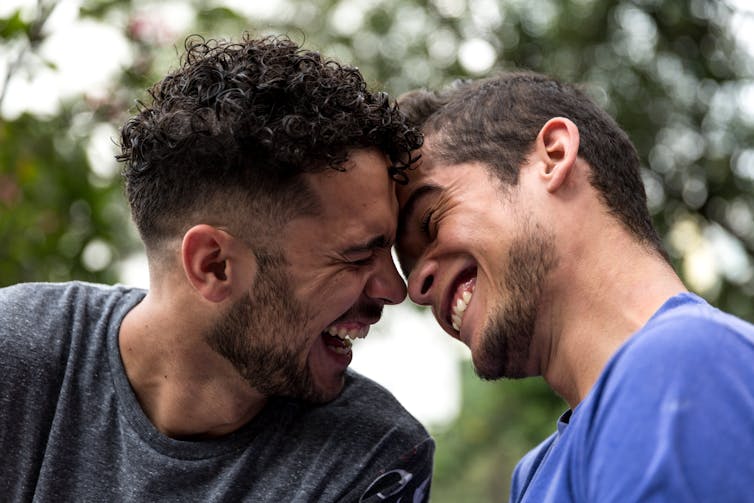From songs and poems to novels and films, romantic love is among the most enduring topics for artworks by way of the ages. However what concerning the science?
Historic, cultural and even evolutionary proof suggests love existed throughout historic instances and throughout many elements of the world. Romantic love has been discovered to exist in 147 of 166 cultures checked out in a single research.
The complexity of affection has a lot to do with how folks expertise it otherwise and the way it can change over time.
Learn extra:
Friday essay: discovering areas for love
Like, love, or ‘in love’?
Psychological analysis over the previous 50 years has investigated the variations between liking somebody, loving somebody and being “in love”.
Liking is described as having optimistic ideas and emotions in direction of somebody and discovering that individual’s firm rewarding. We frequently additionally expertise heat and closeness in direction of the folks we like. In some cases we select to be emotionally intimate with these folks.

Halfpoint/Shutterstock
Once we love somebody we expertise the identical optimistic ideas and experiences as once we like an individual. However we additionally expertise a deep sense of care and dedication in direction of that individual.
Being “in love” consists of all of the above but in addition includes emotions of sexual arousal and attraction. Nevertheless, analysis into folks’s personal views of affection means that not all love is identical.
Passionate vs companionate love
Romantic love consists of two varieties: passionate and companionate love. Most romantic relationships, whether or not they be heterosexual or similar intercourse, contain each these elements.
Passionate love is what folks sometimes contemplate being “in love”. It consists of emotions of ardour and an intense eager for somebody, to the purpose they may obsessively take into consideration eager to be of their arms.

Rawpixel.com/ Shutterstock
The second half is named companionate love. It’s not felt as intensely, however it’s advanced and connects emotions of emotional intimacy and dedication with a deep attachment towards the romantic associate.
How does love change over time?
Analysis modifications in romantic love over time sometimes finds that though passionate love begins excessive, it declines over the course of a relationship.
There are numerous causes for this.
As companions be taught extra about one another and develop into extra assured within the long-term way forward for the connection, routines develop. The alternatives to expertise novelty and pleasure can even decline, as can the frequency of sexual exercise. This could trigger passionate like to subside.

Monkey Enterprise Photographs/ Shutterstock
Though a discount in passionate love will not be skilled by all {couples}, numerous research report roughly 20-40% of {couples} expertise this downturn. Of {couples} who’ve been married in extra of ten years, the steepest downturn is most probably to happen over the second decade.
Life occasions and transitions can even make it difficult to expertise ardour. Folks have competing obligations which have an effect on their power and restrict the alternatives to foster ardour. Parenthood is an instance of this.
Learn extra:
Love by design: when science meets intercourse, lust, attraction and attachment
In distinction, companionate love is usually discovered to extend over time.
Though analysis finds most romantic relationships include each passionate and companionate love, it’s the absence or reductions in companionate love, moreso than passionate love, that may negatively have an effect on the longevity of a romantic relationship.
However what’s the purpose of affection?
Love is an emotion that retains folks bonded and dedicated to at least one one other. From an evolutionary psychology perspective, love developed to maintain the dad and mom of kids collectively lengthy sufficient for them to outlive and attain sexual maturity.
Learn extra:
What is that this factor known as love?
The interval of childhood is for much longer for people than different species. As offspring depend on adults for a few years to outlive and to develop the talents and skills wanted for profitable residing, love is particularly vital for people.
With out love, it’s troublesome to see how the human species may have developed.

Nattakorn_Maneerat/Shutterstock
A organic basis too
Not solely is there an evolutionary basis to like, love is rooted in biology. Neurophysiological research into romantic love present that people who find themselves within the throes of passionate love expertise elevated activation in mind areas related to reward and pleasure.
Learn extra:
Love lockdown: the pandemic has put strain on many relationships, however here is learn how to inform if yours will survive
The truth is, the mind areas activated are the identical as these activated by cocaine.
These areas launch chemical substances corresponding to oxytocin, vasopressin and dopamine, which produce emotions of happiness and euphoria which are additionally linked to sexual arousal and pleasure.
Apparently, these mind areas are usually not activated when desirous about non-romantic relationships corresponding to buddies. These findings inform us that liking somebody will not be the identical as being in love with somebody.
What’s your love fashion?
Analysis has discovered three major kinds of affection. First coined by psychologist John Lee, the love kinds are eros, ludus and storge. These kinds embody folks’s beliefs and attitudes about love and act as a information for learn how to method romantic relationships.

BLACKDAY/ Shutterstock
Eros
This fashion of affection refers to erotic love and is concentrated on bodily attraction and interesting in intercourse, the short growth of robust and passionate emotions for an additional and intense intimacy.
Ludus
This fashion includes being emotionally distant and sometimes includes “game-playing”. It’s not stunning individuals who endorse this love fashion are unlikely to commit, really feel snug ending relationships and sometimes begin a brand new relationship earlier than ending the present one.
Storge
Storge is commonly considered a extra mature type of love. Precedence is given to having a relationship with an individual who has related pursuits, affection is overtly expressed and there may be much less emphasis on bodily attractiveness. Folks excessive on storge love are trusting of others and are usually not needy or depending on others.
Or is a mix extra your fashion?
You may even see your self in multiple of those kinds.
Proof suggests some folks possess a mix of the three foremost love kinds; these mixtures have been labelled by Lee as mania, pragma and agape.
Learn extra:
Darling, I really like you … from the underside of my mind
Manic love consists of intense emotions for a associate in addition to fear about committing to the connection. Pragmatic love includes making wise relationship selections to find a associate who will make an excellent companion and good friend. Agape is a self-sacrificing love that’s pushed by a way of obligation and selflessness.

Gustavo Frazao/ Shutterstock
Why do you’re keen on the way in which you do?
An individual’s love fashion has little to do with their genetics. Quite, it’s related to the event of persona and an individual’s previous relationship experiences.
Some research have discovered people who find themselves excessive on darkish traits, corresponding to narcissism, psychopathy and machiavellianism, endorse extra of a ludus or pragma love fashion.
Learn extra:
There are six kinds of affection. Which one greatest describes you?
Individuals who have an insecure attachment fashion, involving a excessive want for validation and preoccupation with relationship companions, endorse extra mania love, whereas those that are uncomfortable with intimacy and closeness don’t endorse eros love.
Irrespective of the variations in the way in which love is skilled, one factor stays widespread for all: we as people are social animals who’ve a deep fascination for it.


